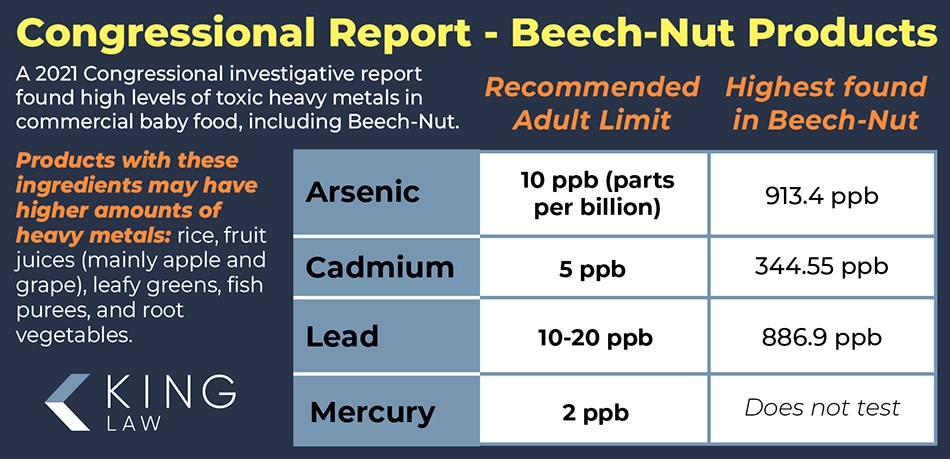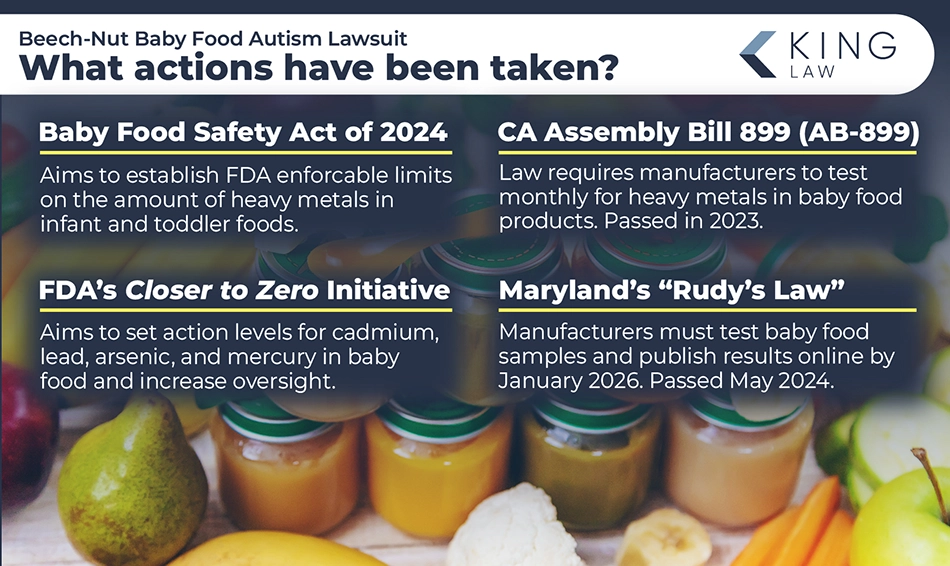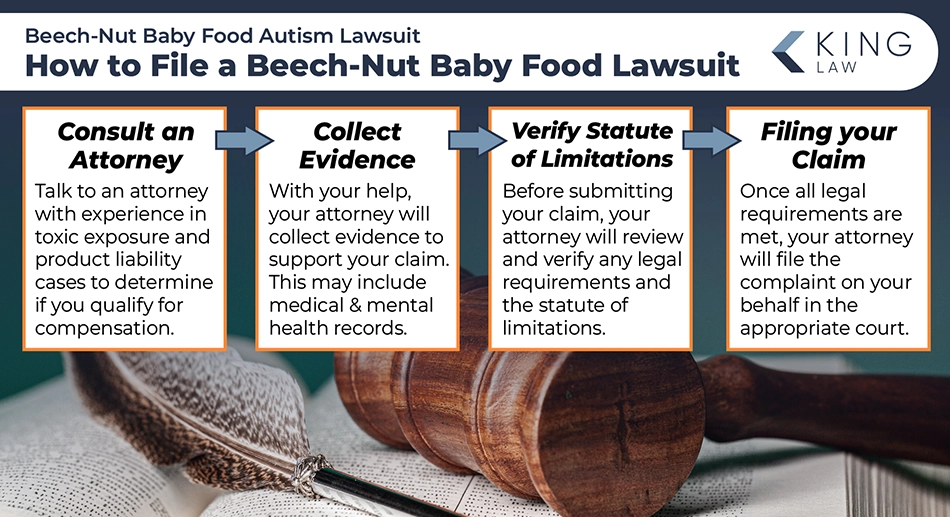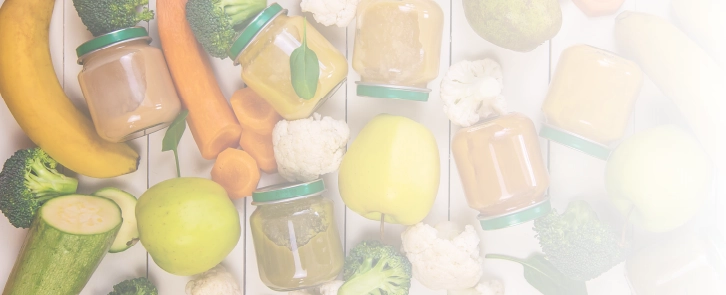We are currently not accepting new Beech-Nut Baby Food cases at this time.
Parents are filing lawsuits against Beech-Nut because they say heavy metals in its baby foods led to autism diagnoses in their children. These lawsuits allege that Beech-Nut knew about the toxins in their baby foods but failed to warn consumers. Many of these lawsuits have been consolidated into MDL#: 3101 – In re: Baby Food Products Liability Litigation. Parents whose children were affected by toxins in Beech-Nut baby foods are continuing to file lawsuits against the manufacturer, saying Beech-Nut did not do enough to protect children.
Beech-Nut Lawsuit – 2025 Update
January 8, 2025: FDA Updates Actions Levels for the Amount of Lead in Baby Foods
The FDA took action in an attempt to limit the amount of lead found in Beechnut baby foods and foods made by other manufacturers. On January 7, 2025, the FDA issued action levels for lead in baby and toddler foods. In an announcement, the FDA issued industry guidance for lead amounts by baby food type. The levels are: 10 parts per billion (ppb) for fruits, most vegetables, mixed purees, yogurts, puddings, and single-ingredient meats; 20 ppb for single-ingredient root vegetables; and 20 ppb for dry infant cereals. These levels are all voluntary, and manufacturers can choose whether or not to adhere to them. Many child-health experts say this guidance does not do enough to protect children. Because there is no safe amount of lead for babies and children, children will likely be harmed by the amount of lead in baby foods. Parents will continue to file lawsuits in hopes of driving change and receiving compensation.
December 19, 2024: Number of Baby Food Autism Lawsuits Expected to Grow Significantly in Coming Months
The number of baby food product liability cases filed against manufacturers such as Beech-Nut is expected to grow substantially in the coming months. The number of lawsuits in the MDL grew by 44% between November and December, with numbers estimated to surpass this increase into the new year.
December 11, 2024: Agenda Set for December 12 Case Management Conference in Baby Food MDL
A proposed agenda was filed for the December 12 case management conference in the baby food products liability MDL currently pending out of the Northern District of California. The agenda included moving the May 29 case management conference date to May 22, 2025, setting discovery schedules, and setting deadlines for other pre-trial matters.
November 1, 2024: Target Deadline Approaching for FDA to Issue Final Guidance on Lead in Baby Foods
According to its Closer to Zero initiative, the U.S. Food and Drug Administration has set a target deadline of December 2024 to issue final guidance for the amount of acceptable lead in commercial baby food products. Prior to now, there has been little regulatory oversight of the baby food product industry.
October 1, 2024: New Maryland Law Will Require Testing of Baby Food Products
A new law passed in Maryland will require baby food manufacturers to test a representative sample of each production for heavy metals beginning January 1, 2025. By the following year, the manufacturers are required to provide a link to the testing results on their website.
April 5, 2024: JPML Issues Order Consolidating Baby Food Lawsuits Into MDL 3101
The Judicial Panel on Multidistrict Litigation (JPML) has issued an order to consolidate fifteen related cases out of nine districts into multidistrict litigation out of the Northern District of California. Defendants in MDL#: 3101 – In Re: Baby Food Products Liability include Beech-Nut Nutrition Company, Gerber, and Earth’s Best Organic.
About the Beech-Nut Baby Food Lawsuit:
Understanding the Beech-Nut Baby Food Lawsuit
2021 Congressional Report: Beech-Nut Baby Food Finding and Insights
Toxic Metals Found in Beech-Nut Baby Foods
Beech-Nut Baby Food Products With Heavy Metals
Studies Linking Autism to Baby Food Consumption
Beech-Nut’s Response to Toxic Metal Allegations in Baby Food
Federal Government’s Initiatives to Eliminate Heavy Metals in Baby Food
Eligibility Criteria for the Beech-Nut Baby Food Lawsuit
Evidence Needed to File a Beech-Nut Baby Food Lawsuit
What Damages Can I Recover in the Beech-Nut Baby Food Lawsuit?
How to File a Beech-Nut Baby Food Lawsuit
Beech-Nut Baby Food Settlement and Payout Amounts
Statute of Limitations and Deadlines to File a Beech-Nut Baby Food Lawsuit
Understanding the Beech-Nut Baby Food Lawsuit
Parents across the country are filing lawsuits against Beech-Nut and other baby food manufacturers, alleging the companies knew or should have known that their products contained dangerous levels of toxic metals. Exposure to these metals has been linked with autism, particularly in babies and young children. Research shows commercial baby foods manufactured by Beech-Nut contain arsenic, lead, cadmium, and mercury.
As of December 2024, litigation against Beech-Nut is ongoing. It is currently in the discovery phase with the court hearing pretrial motions. Concerns over the danger of metals in baby food products grew after a 2021 Congressional Report found dangerously high levels of toxic heavy metals in baby food products manufactured by Beech-Nut and other companies. Beech-Nut has denied many of the allegations in legal complaints filed nationwide, noting that the presence of these metals is attributable to natural sources in soil and water and not industrial practices.
Parents, however, are encouraged to be vigilant and consult with an attorney if their child has been diagnosed with autism after consuming Beech-Nut products for at least six months.
2021 Congressional Report: Beech-Nut Baby Food Finding and Insights
On February 4, 2021, the U.S. House of Representatives Subcommittee on Economic and Consumer Policy Committee on Oversight and Reform released a detailed report indicating high levels of toxic heavy metals were present in commercial baby food products throughout the country. The report, called “Baby Foods Are Tainted with Dangerous Levels of Arsenic, Lead, Cadmium, and Mercury” found that foods made by Beech-Nut Nutrition Company and other baby food manufacturers had high levels of various heavy metals in their products.
Beech-Nut, in particular, used ingredients that contained arsenic levels of 913 parts per billion (ppb), 344 ppb of cadmium, and 886.9 ppb of lead. The company did not test its ingredients or final products for mercury. Despite being aware of these high levels of toxic heavy metals, the company continued to send its products to market. Additionally, they failed to test the final product, only testing individual ingredients.
As a result of the report, Beech-Nut announced in June 2021 that they would stop selling a version of their rice cereal due to high levels of arsenic. A recall was also issued in response to the sampling.

Toxic Metals Found in Beech-Nut Baby Foods
Internal and independent testing detected concerning levels of toxic heavy metals in Beech-Nut baby food products sold in the U.S. These metals occur naturally in the environment and are generally absorbed by plants used as ingredients in baby and toddler foods. Despite evidence linking heavy metals and developmental delays in children, there has been little oversight or regulation to control the levels of heavy metals in baby food products.
Heavy Metals Identified in Beech-Nut Baby Food Products:
- Arsenic (As)
- Lead (Pb)
- Cadmium (Cd)
- Mercury (Hg)
Beech-Nut acknowledged that heavy metals were present in their products, submitting internal testing results to the Subcommittee on Economic and Consumer Policy Committee on Oversight and Reform. However, the company claims that they have worked to minimize the levels of toxic heavy metals in their products.
Arsenic
Arsenic is a naturally occurring substance that can be toxic if consumed by humans. Testing of commercial infant rice cereal, including that manufactured by Beech-Nut, found high levels of arsenic. Rice cereals were the top source of arsenic exposure in infants.
A 2019 Healthy Babies Bright Futures study found that four of seven rice cereals tested contained inorganic arsenic in excess of 100 parts per billion (the FDA’s proposed action level).
In 2023, a Consumer Reports study determined that while levels of arsenic had improved, they were still unsafe in many products. For instance, experts recommend only consuming .5 servings of Beech-Nut Naturals Sweet Potato due to the high level of arsenic.
Lead
The 2019 Healthy Babies Bright Futures study detected lead exceeding the 1 ppb limit recommended by experts in 83% of the products tested. Products with particularly concerning levels of lead included fruit juices, rice-based products, and foods containing root vegetables.
While the 2023 Consumer Reports study found improvements in the levels of some toxic heavy metals, testing also showed increases in lead. Lead was even detected in some products that did not contain lead during previous sampling efforts.
Cadmium
Ingesting cadmium can cause serious problems, particularly in young children and babies. The 2019 Healthy Babies Bright Futures survey found cadmium in 75% of commercial baby foods tested. Cadmium is frequently found in products containing root vegetables such as carrots and sweet potatoes. While testing of baby food products showed improved levels of cadmium in the 2023 Consumer Reports study, the problem had not been eradicated.
Mercury
Mercury is highly toxic to humans but can be particularly harmful to infants and young children. According to a study published in the Current Problems in Pediatric and Adolescent Health Care, there is no known level of mercury exposure that is safe.
Despite its toxicity, the majority of baby food manufacturers do not test for it. As reported by Harvard Health, only one of the four companies that responded to the Subcommittee on Economic and Consumer Policy Committee on Oversight and Reform requests for heavy metal levels in their products tested for the metal.
Beech-Nut Baby Food Products With Heavy Metals
Testing indicates that many Beech-Nut baby food products contain heavy metals (e.g., arsenic, lead, cadmium, and mercury). In many instances, the products were contaminated with more than one toxic metal.
Beech-Nut baby food products containing arsenic:
- Beech-Nut Rice Cereal: In June 2021, the company voluntarily recalled several lots of its single-grain rice cereal after testing by the State of Alaska found arsenic levels exceeding the FDA’s recommended limit of 100 ppb.
Beech-Nut baby food products containing lead:
- Beech-Nut Sweet Potatoes: Testing of raw materials showed lead levels as high as 886.9 ppb. According to the 2023 Consumer Reports study, infants should consume less than half of a serving per day.
Beech-Nut baby food products containing cadmium:
- Cadmium levels in raw materials were as high as 344.55 ppb.
Beech-Nut baby food products containing mercury:
- The company did not test products for mercury levels.
Studies Linking Autism to Baby Food Consumption
Multiple studies published over the last decade indicate a link between autism and exposure to heavy metals from baby food consumption. This research shows that infants and young children are particularly vulnerable to toxic heavy metal exposure due to their developing brains and bodies. Babies and children also eat more food in proportion to their body weight than adults do. This can lead to increased exposure to heavy metals and the associated health effects.
Association Between Heavy Metals Exposure and Child Autistic Disorder
According to “Association between heavy metals exposure (cadmium, lead, arsenic, mercury) and child autistic disorder: a systematic review and meta-analysis,” children with autism spectrum disorder had higher concentrations of cadmium, arsenic, lead, and mercury compared to the control group. The study noted that sources of exposure included environmental pollutants and contamination during the manufacturing process.
The meta-analysis, published in Frontiers in Pediatrics in July 2023 and authored by Mengmeng Ding, Shanshan Shi, Shuyan Qie, Jinglu Li, and Xiaoming Xi, looked at 53 studies involving over 5,000 people under the age of 18. Ultimately, the study concluded that further research was needed to determine the impact heavy metal exposure from baby food has on young children and infants.
Investigating the Role of Food Pollutants in Autism Spectrum Disorder
A study published in Naunyn-Schmiedeberg’s Archives of Pharmacology on October 28, 2024, investigated the impact food pollutants have on autism spectrum disorder (ASD).
The research, authored by Zahra Shamsipour Nehzomi and Kobra Shirani, showed that individuals with autism had higher levels of lead, mercury, and cadmium in their systems, likely as a result of consumption of non-organic produce, pesticides in foods, and food additives such as artificial colors and preservatives.
Toxic Heavy Metal Content of Infant and Toddler Foods and Evaluation of United States Policy
A study published on June 26, 2022, in Frontiers in Nutrition aimed to evaluate policies in the U.S. designed to mitigate heavy metal exposure in infant and toddler foods and to discuss what is currently known about these metals.
The research, authored by Emily C. Bair, noted that the raw materials used in baby food products often contain arsenic, lead, mercury, and cadmium as a result of contaminated soil and water. Despite the toxicity of these metals, there is little oversight and regulation of the baby food industry.
Association of Autism With Toxic Metals
In 2021, authors Cecilia N. Amadi, Chinna N. Orish, Chiara Frazzoli, and Orish E. Orisakwe sought to evaluate the association between ASD and environmental factors, such as exposure to toxic metals. The study, published in Pharmacology Biochemistry and Behavior, found that there were higher concentrations of cadmium, lead, and mercury in the hair and urine samples of children with ASD. As a result of the findings, the authors suggest a focus on reducing heavy metals in the body as a therapeutic strategy for children with ASD.
Beech-Nut’s Response to Toxic Metal Allegations in Baby Food
After the 2021 Congressional report, Beech-Nut acknowledged the presence of toxic heavy metals in their products. The company was one of four that responded to the subcommittee’s requests to provide internal testing results for the levels of arsenic, cadmium, and lead in their raw ingredients. Beech-Nut did not test for mercury and did not test final products for heavy metal levels; they only tested raw ingredients.
A blog on Beechnut’s website noted that while heavy metals cannot be avoided, Beech-Nut has implemented rigorous testing to ensure minimal exposure. Additionally, the company assures adherence to FDA regulations and is adding a scannable QR code to products beginning in 2025 that will link to testing results in compliance with California Assembly Bill 899. Despite these efforts, the company continues to face scrutiny due to the concerning levels of heavy metals found in its products.
Federal Government’s Initiatives to Eliminate Heavy Metals in Baby Food
State and federal regulators have responded to a growing amount of research linking exposure to heavy metals with an increased risk of autism spectrum disorder. Prior to now, there was little regulatory oversight in the baby food industry. By 2025, it is expected that the FDA will issue guidance on heavy metal limits as part of their Closer to Zero initiative, and more states will pass laws requiring manufacturers to test products for these toxins.
Legislative and Regulatory Actions on Heavy Metals in Baby Foods
Although many people argue stronger state and federal regulations are needed to protect children from heavy metals in baby foods, some government action has been taken.
- Baby Food Safety Act of 2024: This bill was introduced by Senator Amy Klobuchar on May 9, 2024. The bill, if passed, would establish limits on the amount of heavy metals (arsenic, lead, cadmium, and mercury) that could be present in infant and toddler foods and would allow the FDA to enforce these limits. It would also require baby food manufacturers to regularly test products and maintain records of the results.
- FDA’s Closer to Zero Initiative: The U.S. Food and Drug Administration launched its Closer to Zero initiative in 2021 after multiple studies, including a congressional report, showed dangerous levels of toxic heavy metals in commercial baby food products. The initiative aims to set action levels of cadmium, lead, mercury, and arsenic and increase oversight.
- California Assembly Bill 899 (AB-899): This bill was signed into law on October 10, 2023, by Governor Gavin Newsom. The law requires baby food manufacturers to test products monthly for heavy metals beginning in January 2025 and to post results online.
- Maryland’s “Rudy’s Law”: Passed in May 2024, requires manufacturers to test a representative sample of baby food products beginning January 2025 and to post results online beginning January 2026.

Eligibility Criteria for the Beech-Nut Baby Food Lawsuit
In order to file a successful Beech-Nut baby food lawsuit, individuals must meet certain eligibility criteria. While many parents of children who have been diagnosed with autism after consuming Beech-Nut baby food products will qualify, it is important to discuss your case with an attorney to ensure eligibility.
Eligibility criteria for a Beech-Nut baby food lawsuit:
- Born on or after January 1, 2007
- Consumed Beech-Nut baby food products for at least six months
- Diagnosed with autism before the age of 14
Who Would Be Excluded From the Beech-Nut Lawsuit?
There are some factors that may exclude you or your child from filing a Beech-Nut lawsuit. An attorney can help ensure that you meet the eligibility requirements and have a valid claim for damages.
Factors that may disqualify you or your child from a Beech-Nut lawsuit:
- Pre-term birth (prior to 37 weeks)
- Low birth weight (less than 5.5 pounds at birth)
- Born before 2008
- Autism diagnosis after the age of 14
- Less than six months of consumption of Beech-Nut baby food products
- Diagnosed with another syndrome or condition
- Mother had other health or pregnancy complications
- Involvement in related litigation
- Advanced age at conception
Evidence Needed to File a Beech-Nut Baby Food Lawsuit
Beech-Nut baby food lawsuits must be supported by evidence. Evidence that can help substantiate your claim includes your child’s medical records and neurodevelopmental assessments, as well as documentation indicating the purchase of at least six months’ worth of Beech-Nut baby food products. An experienced attorney can help you track down this information.
Evidence needed to file a Beech-Nut baby food claim:
- Medical records
- Mental health records
- Proof of diagnosis
- Neurodevelopmental assessments
- Proof of purchase of Beech-Nut baby food
- Receipts
- Bank statements
- Loyalty program records
- Witness statements
- Product labels
- Marketing materials
- Growth charts
- Family history records
- Food diaries
- Hair and blood samples showing heavy metal exposure
What Damages Can I Recover in the Beech-Nut Baby Food Lawsuit?
Recoverable damages in a Beech-Nut baby food lawsuit include past and future medical costs, expenses related to therapy and counseling, emotional distress, loss of quality of life, and costs related to childcare. Successful plaintiffs may also be entitled to compensation for educational support, lost wages, and expenses associated with home modifications and assistive devices.
Depending on the circumstances of the case, a court may also award damages related to attorney’s fees, court costs, and allocations for a special needs trust. In cases where there is egregious misconduct, a court may award punitive damages to deter similar conduct in the future.
How to File a Beech-Nut Baby Food Lawsuit
There are several steps to file a Beech-Nut baby food lawsuit. It is important to discuss your case with an attorney to determine whether you have a valid claim for damages and should pursue legal action. A lawyer will also guide you through the process and ensure timely filing of your case.
Steps to File a Beech-Nut Baby Food Lawsuit:
- Consult with a Qualified Attorney: The first step in a Beech-Nut baby food autism lawsuit is to consult with an attorney experienced in toxic exposure or product liability cases. An attorney will help determine whether you qualify for legal compensation and will provide guidance throughout the process.
- Collect Evidence to Support Your Claim: After ensuring you are eligible to file a lawsuit, your attorney may have you collect evidence to help substantiate your case. This evidence may include your child’s medical and mental health records, proof of purchase of baby food products, and witness statements. Your attorney can advise you on confidentiality throughout this process.
- Verify Statute of Limitations: Before filing, your attorney will review legal requirements, such as the statute of limitations. Failure to file your claim within the statute of limitations may result in your case being denied.
- File the Claim: Once all legal requirements are met, your attorney will file the complaint in the appropriate courthouse.

Beech-Nut Baby Food Settlement and Payout Amounts
While the baby food product liability claims are still in their infancy, potential settlements are expected to range from $500,000 to $1.5 million. Several factors can influence the potential value of your case, including the severity of the autism, whether the condition impacted the child’s quality of life, past and future medical expenses, and whether the injury is permanent. It is strongly recommended that you consult with an attorney as early in the process as possible to determine potential damages.
Statute of Limitations and Deadlines to File a Beech-Nut Baby Food Lawsuit
The statute of limitations in a Beech-Nut baby food lawsuit is state-specific and may depend on a number of factors, including the date the injury was discovered, such as the date of the autism diagnosis. The deadline to file a case generally ranges from 1 to 6 years. It is essential, however, to consult with an attorney to determine how long you have to file a lawsuit and what state-specific deadlines may apply to your case.
Contact a Beech-Nut Baby Food Lawyer
Parents of children who have been diagnosed with autism prior to age 14 after consuming at least six months of Beech-Nut baby food products may be eligible for compensation. Aggrieved parties are encouraged to contact King Law to discuss their legal options. The attorneys at King Law are well-versed in toxic exposure cases, such as lawsuits against baby food manufacturers. We will work tirelessly to ensure you and your child receive the outcome you deserve. Contact King Law today to speak with a qualified attorney.

